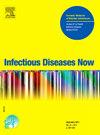Amoxicillin/clavulanate activity against bacteria isolated in severe community-acquired pneumonia: a retrospective study (sCAP)
IF 2.2
4区 医学
Q2 INFECTIOUS DISEASES
引用次数: 0
Abstract
Background
Severe community-acquired pneumonia (sCAP) requires prompt empirical antibiotic therapy. Amoxicillin-clavulanate (AMC), an “Access” antibiotic per WHO AWaRe classification, could possibly constitute an ecologically preferable alternative to third-generation cephalosporins (3GCs).
Objectives
To assess AMC susceptibility in bacterial isolates from sCAP patients and to identify factors associated with AMC resistance.
Methods
A retrospective single-center study was conducted between 2019 and 2021 in a single ICU. Patients with sCAP and positive respiratory cultures within 48 h were included.
Results
In 185 patients, 212 isolates were identified. AMC susceptibility was 83.5 % overall, with the highest rates for S. pneumoniae (97.9 %), H. influenzae (84.6 %), and S. aureus (96.1 %). Prior antibiotic use within three months was the only independent factor associated with AMC resistance (p < 0.00001). Susceptibility reached 90.9 % in patients without prior antibiotic use.
Conclusion
AMC is a viable empirical option for sCAP treatment in patients without recent antibiotic exposure, offering more pronounced ecological benefits than 3GCs.
阿莫西林/克拉维酸对严重社区获得性肺炎分离细菌的活性:回顾性研究(sCAP)
背景:严重社区获得性肺炎(sCAP)需要及时的经验性抗生素治疗。阿莫西林-克拉维酸(AMC)是世卫组织AWaRe分类中的一种“可获得”抗生素,在生态上可能是第三代头孢菌素(3gc)的更好替代品。目的评估sCAP患者分离的细菌对AMC的敏感性,并确定AMC耐药的相关因素。方法于2019 - 2021年在单个ICU进行回顾性单中心研究。纳入48 h内sCAP和呼吸培养阳性的患者。结果185例患者共分离出212株。AMC的总体易感性为83.5%,其中肺炎链球菌(97.9%)、流感嗜血杆菌(84.6%)和金黄色葡萄球菌(96.1%)的易感性最高。既往3个月内使用抗生素是与AMC耐药相关的唯一独立因素(p <;0.00001)。未使用过抗生素的患者对抗生素的敏感性达到90.9%。结论对于近期无抗生素暴露的sCAP患者,amc是一种可行的经验选择,具有比3gc更明显的生态效益。
本文章由计算机程序翻译,如有差异,请以英文原文为准。
求助全文
约1分钟内获得全文
求助全文
来源期刊

Infectious diseases now
Medicine-Infectious Diseases
CiteScore
7.10
自引率
2.90%
发文量
116
审稿时长
40 days
 求助内容:
求助内容: 应助结果提醒方式:
应助结果提醒方式:


